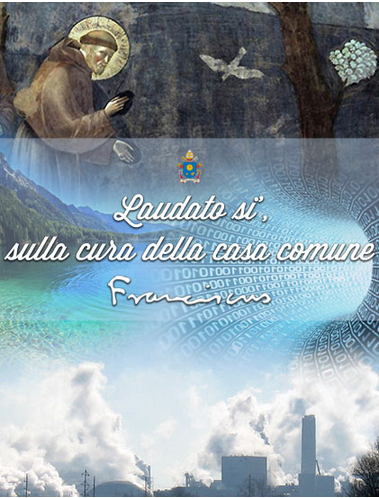 Pope Francis is calling on humankind to take better care of our home. The Pope, like those before him, has been vocal about climate change and the role humans have played. In LAUDATO SI’ On Care of Our Common Home, Pope Francis writes that our lifestyle of a “throw-away” society – consumption and waste – must change or humans will bring further harm to our home, and that change must be done collectively.
Pope Francis is calling on humankind to take better care of our home. The Pope, like those before him, has been vocal about climate change and the role humans have played. In LAUDATO SI’ On Care of Our Common Home, Pope Francis writes that our lifestyle of a “throw-away” society – consumption and waste – must change or humans will bring further harm to our home, and that change must be done collectively.
Pope Francis’ Encyclical spans six chapters with each section focused on a particular area of importance to climate change discussions and action steps to be undertaken. Two areas in particular address energy and agriculture.
On Energy:
“We know that technology based on the use of highly polluting fossil fuels – especially coal, but also oil and, to a lesser degree, gas – needs to be progressively replaced without delay. Until greater progress is made in developing widely accessible sources of renewable energy, it is legitimate to choose the lesser of two evils or to find short-term solutions.”
Pope Francis adds that all countries must come together to develop “renewable and less polluting forms of energy.”
On Biotechnology:
He writes that through technology, such as biotechology, where once humans and nature worked together today, “the relationship has become confrontational”. “Often a vicious circle results, as human intervention to resolve a problem further aggravates the situation. For example, many birds and insects which disappear due to synthetic agrotoxins are helpful for agriculture: their disappearance will have to be compensated for by yet other techniques which may well prove harmful.”
Pope Francis shows not to be wholly against biotechnology, but not wholly for biotechnology either.
On GMOS:
“Although no conclusive proof exists that GM cereals may be harmful to human beings, and in some regions their use has brought about economic growth which has helped to resolve problems, there remain a number of significant difficulties which should not be underestimated. In many places, following the introduction of these crops, productive land is concentrated in the hands of a few owners due to “the progressive disappearance of small producers, who, as a consequence of the loss of the exploited lands, are obliged to withdraw from direct production.” … The expansion of these crops has the effect of destroying the complex network of ecosystems, diminishing the diversity of production and affecting regional economies, now and in the future.
While Pope Francis doesn’t challenge the safety science of GMOs, he does challenge what he calls “corporate greed” or those companies that “own” the technology and push out the seeds of small, local producers.
On Crop Inputs:
“Technology, which, linked to business interests, is presented as the only way of solving these problems, in fact proves incapable of seeing the mysterious network of relations between things and so sometimes solves one problem only to create others.”
Pope Francis acknowledges that there are many factors causing soil, and water pollution; yet, points directly to negative ecological health roles played by fertilizers, insecticides, fungicides, herbicides and agrotoxins.
There is much to learn from Laudato Si but if only one message is learned from Pope Francis’ work it is this: all peoples must work together to restore a state of health and beauty to earth.
